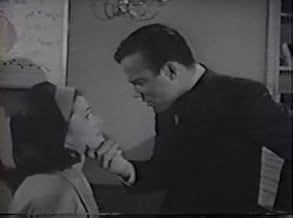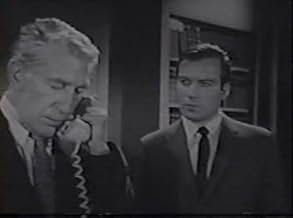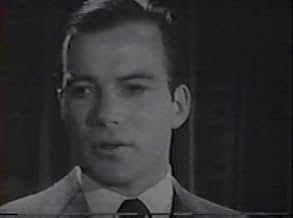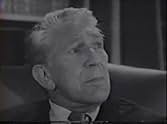El fiscal de Nueva York David Koster arriesga su carrera y matrimonio por buscar justicia, mientras su jefe Celese y el detective Malloy tratan de controlarlo, y las prioridades musicales de... Leer todoEl fiscal de Nueva York David Koster arriesga su carrera y matrimonio por buscar justicia, mientras su jefe Celese y el detective Malloy tratan de controlarlo, y las prioridades musicales de su esposa Phyllis chocan con las de él.El fiscal de Nueva York David Koster arriesga su carrera y matrimonio por buscar justicia, mientras su jefe Celese y el detective Malloy tratan de controlarlo, y las prioridades musicales de su esposa Phyllis chocan con las de él.
Explorar episodios
Argumento
¿Sabías que…?
- ConexionesReferenced in What's My Line?: Jack Lemmon (4) (1965)
Opinión destacada
William Shatner was a rising star in the mid 1960s. He had been making the rounds, doing guest shots on a lot of the prime time dramas of the day, including two separate and very memorable turns on Rod Serling's "The Twilight Zone."
But here, he got his first chance to lead his own series. Shatner played David Koster, a cutting edge prosecutor -- Assistant DA for the City of New York, who was determined to find the truth and present it in court and to prosecute the toughest criminals in town and get them locked up, at any cost. His boss was played by Howard da Silva, who we see every July, permanently preserved as Ben Franklin in the motion picture version of the Broadway musical, "1776." Long time character actor Lonny Chapman was a plainclothes police officer frequently involved in the cases Koster attempted to mount.
Jessica Walter lightened things up both for Koster and for the audience as Koster's wife, Phyllis, as the program gave you the homelife of the Kosters in addition to the work issues, which was something that wasn't all that common at the time for a program of this type.
Another element that gave a lot of authenticity to this series was on location filming around town. The steps of the Supreme Court, the sidewalks and streets of the city, all on display to provide the backdrop for this program, and frankly, it's fascinating just to see the footage they shot of 1965 New York, the shops and storefronts, the vehicles negotiating the intersections and the clothing people wore to their jobs or for leisure.
As I implied, this show managed to mix in a bit of comedy with the drama, humanized the persons involved in the process and created both some genuine conflict and some legitimate questions about how the law worked and why our system of justice is important. In some ways, some people NOW should take a look at this series and learn a few things about how and why we bring cases to court!
The problem this show had was its timeslot. CBS scheduled "For The People," Sunday Night at 9pm Eastern. The good news was that meant the show followed one of the highest rated programs on television: "The Ed Sullivan Show."
The bad news was it got placed opposite one of the most popular shows on TV at the time, NBC's western family series, "Bonanza."
No matter why or how, "For The People" got the ax at the end of the season. If it had succeeded, Mr. Shatner would have stayed with that series and would not have been available to audition for a new program about the crew of a spaceship, traveling centuries from now, exploring the galaxy and visiting strange new worlds.
In that sense, "For The People" is especially notable in its cancellation for allowing William Shatner to accept the role of Captain James T. Kirk on NBC's "Star Trek," the following season.
But here, he got his first chance to lead his own series. Shatner played David Koster, a cutting edge prosecutor -- Assistant DA for the City of New York, who was determined to find the truth and present it in court and to prosecute the toughest criminals in town and get them locked up, at any cost. His boss was played by Howard da Silva, who we see every July, permanently preserved as Ben Franklin in the motion picture version of the Broadway musical, "1776." Long time character actor Lonny Chapman was a plainclothes police officer frequently involved in the cases Koster attempted to mount.
Jessica Walter lightened things up both for Koster and for the audience as Koster's wife, Phyllis, as the program gave you the homelife of the Kosters in addition to the work issues, which was something that wasn't all that common at the time for a program of this type.
Another element that gave a lot of authenticity to this series was on location filming around town. The steps of the Supreme Court, the sidewalks and streets of the city, all on display to provide the backdrop for this program, and frankly, it's fascinating just to see the footage they shot of 1965 New York, the shops and storefronts, the vehicles negotiating the intersections and the clothing people wore to their jobs or for leisure.
As I implied, this show managed to mix in a bit of comedy with the drama, humanized the persons involved in the process and created both some genuine conflict and some legitimate questions about how the law worked and why our system of justice is important. In some ways, some people NOW should take a look at this series and learn a few things about how and why we bring cases to court!
The problem this show had was its timeslot. CBS scheduled "For The People," Sunday Night at 9pm Eastern. The good news was that meant the show followed one of the highest rated programs on television: "The Ed Sullivan Show."
The bad news was it got placed opposite one of the most popular shows on TV at the time, NBC's western family series, "Bonanza."
No matter why or how, "For The People" got the ax at the end of the season. If it had succeeded, Mr. Shatner would have stayed with that series and would not have been available to audition for a new program about the crew of a spaceship, traveling centuries from now, exploring the galaxy and visiting strange new worlds.
In that sense, "For The People" is especially notable in its cancellation for allowing William Shatner to accept the role of Captain James T. Kirk on NBC's "Star Trek," the following season.
- DeanNYC
- 24 abr 2024
- Enlace permanente
Selecciones populares
Inicia sesión para calificar y agrega a la lista de videos para obtener recomendaciones personalizadas
- How many seasons does For the People have?Con tecnología de Alexa
Detalles
- Fecha de lanzamiento
- País de origen
- Idioma
- También se conoce como
- Syyttäjän oikeus
- Locaciones de filmación
- Productoras
- Ver más créditos de la compañía en IMDbPro
- Tiempo de ejecución1 hora
- Color
- Mezcla de sonido
- Relación de aspecto
- 1.33 : 1
Contribuir a esta página
Sugiere una edición o agrega el contenido que falta

Principales brechas de datos
What is the English language plot outline for For the People (1965)?
Responda






























